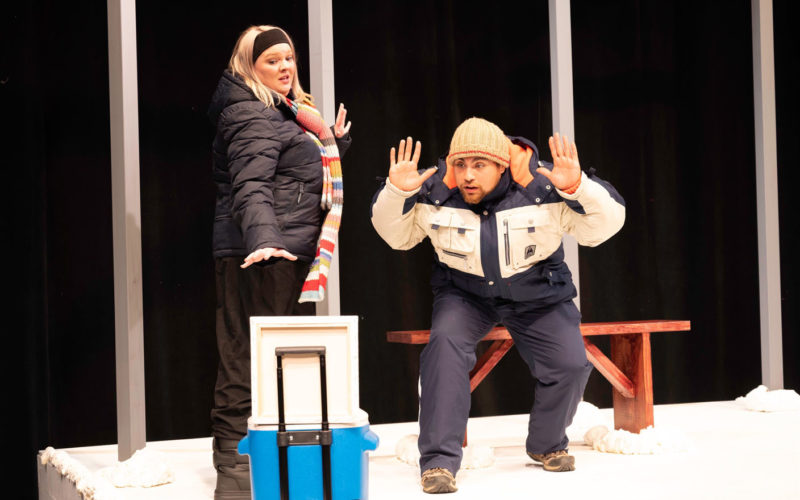BECCA MARTIN-BROWN
bmartin@nwaonline.com
Editor’s Note: I’m in my first theatrical production in a very long time — “Almost, Maine,” on stage this weekend and next at Arkansas Public Theatre in Rogers. Of course I couldn’t write the story about the play — conflict of interest — but I could reach out to playwright John Cariani to talk about the show. Here’s what he very thoughtfully had to say via email. (By the way, in the interest of full disclosure, I play Marvalyn.)
Q. Where were you — geographically or in your life — that inspired the idea of a place called Almost, Maine?
A. I was in New York City, beginning my career as an actor. And I think I was missing the big sky of northern Maine, which is where I’m from. (I’m from as far north of New York City as Raleigh, N.C., is south of New York City.). And I was a little overwhelmed by city life. And writing about “home” probably gave me comfort.
And … “Almost, Maine” came to be because of some monologues I had written for myself as a young actor. When I first moved to the city, I needed audition material — monologues that I really connected to, and that hadn’t been overdone. So I wrote my own. Some of those monologues became sketches and short plays, and, as I wrote them, I realized I was writing about the people I had grown up with — rural, working people. And I started to realize that I never saw these people in the plays I was reading/auditioning for as actor. The plays I was reading mostly told city-stories — stories filled with cosmopolitan ideas and ideals; stories about wealthy, famous, worldly, powerful, well-educated people who lived and worked in urban areas. This was thrilling, because the city and its stories and its people were new to me! But I started to get sick of those stories after a while. And I wondered … what about rural stories? What about stories about the people I grew up with? What about people who live and work in wide open spaces, like farmers and people who work in the forestry industry? Those people don’t really populate contemporary plays. So I started writing about them. Because their perspective is so important. Because a person from a place where the sky is big and star-filled at night, like northern Maine, is going to have a markedly different perspective — literally — from a person who lives in New York City and only sees the sky in slivers, or who can’t see the stars because of light pollution.
Q. Are there specific characters that were inspired by people in your life?
A. They’re definitely composites of people I grew up with.
I stole Marvalyn’s difficult situation from someone my family knew growing up. And I stole the name Marvalyn from a friend from college, Marvalyn DeCambre.
There’s an honesty, a straightforwardness, a guilelessness to the people from northern Maine (or there used to be, before social media and the internet). And I think I wanted to put that honesty, that guilelessness, that straightforwardness on stage.
Q. Do you see yourself in any of the characters?
A. I’m in all the characters. I came late to love … and to understating who I loved … and when I saw all my friends falling in love for the first time in high school, I wondered why I wasn’t falling in love with anybody … and then, when I did start falling in love … I wondered why I was falling in love with other guys. I think I wrote “Almost, Maine” because I was working out some of the issues I had with finding love when I was younger.
Q. Is there a character — or more than one — who is your favorite?
A. The fellas in the scene called “They Fell” are me and my husband. Metaphorically. So I am partial to them.
I now identify most strongly with Hope in “The Story of Hope.” Because Hope went away from Almost … and now that she’s back … she doesn’t quite fit in anymore. I feel like I’m caught between my rural upbringing and the urban place I live now. I’m still searching for my place in this world.
As far as a favorite goes … well, it’s hard to pick a favorite. It’s like asking a parent to pick their favorite kid. But … I think Rhonda is my favorite — she’s just a great person. She helps everybody else out. That’s rural America for you. People help each other out.
Q. Out of the nine stories, how many do you see as happy endings?
A. They’re happy-ish endings. They’re not easy, happy endings. They’re not endings at all, actually. They are complex, fragile, and sometimes awful suspensions, fraught with uncertainty.
I do think that, at the close of each story in the play, the characters are about to experience joy. Great joy. But not just yet — not in what I’ve written. In what I’ve written, the lights fade on the moment of change. And change is hard and confusing and uncertain. The real, unmitigated joy happens after these scenes end. What the folks of Almost (and, therefore, what audiences) experience at the end of these scenes is that moment just before the joy! It’s there, bubbling under the surface, and I definitely think there’s room for a hint of the joy to come. But — going straight to joy is the easy way to do the play. And love isn’t easy in life or in any of these scenes, especially in Scenes 6 and 7 (“Where It Went” and “Story of Hope”). Only at the end of the final scene in the play (“Seeing the Thing”) does the audience get a true, cathartic “happy ending.” Joy has to be earned, and I think only Rhonda and Dave have earned it. All of the other folks in this play have to wade through fear or sadness or pain before they get the joy! The “almost-happiness” of Scenes 1 through 5 and the bittersweetness — heck, bitterness — of Scenes 6 and 7 will make the end of Scene 8 wonderfully cathartic and deliriously joyful. (And, yes, the last scene of Act One — “Getting It Back” — has a pretty happy ending, but that whole scene is a fight — the consequences of which must be dealt with. And, yes, the “Epilogue” has a happy ending, too. But the joy there has been earned, because the “Prologue” ends in the utter uncertainty of a quiet, gentle, profound disaster.)
So … only one real “happy ending.” And some happy-ish endings. And a couple of really sad endings.
Q. Such a cliche question, I know, but how does it feel to know that in far-flung places from Rogers, Arkansas, to God knows where, your characters are being explored and embodied and loved?
A. Here’s my answer: “There are more things in heaven and earth than can be dreamt of in your philosophy.” Horatio says that to Hamlet in … “Hamlet.”
That’s what “Almost, Maine’s” success feels like — far more than I ever imagined. And it’s thrilling. I mean — I wrote the play some 20-25 years ago. And it quietly came and went Off-Broadway without much fanfare. And then it got published and slowly caught on, and now it’s one of the most popular plays in the country — and around the world. (While you’re doing the play in Arkansas, it’s being done at dozens of places all over the U.S …. and in Belgium and Latvia and Korea.)
Q. What do you hope audiences walk away thinking about, talking about, when they leave the show? Is there a “moral” you hope is conveyed?
A. Love and pain and hope and joy and hopelessness and sadness coexist. But love and hope and joy have to win.
Finding love is hard and scary. Keeping love is hard and scary.
And … working people should be taken seriously as the stars of love stories.
And … the rich and powerful don’t own “extraordinary.” Ordinary people experience the extraordinary.
And just because someone’s life is hard doesn’t mean it’s joyless.
And you just never know what might happen in your life. It’s unpredictable. It can be unpredictably wonderful. And unpredictably awful. All at once. There are forces at work that are out of our control.
And … hope is never lost. It just hides sometimes.
__
FAQ
‘Almost, Maine’
WHEN — 8 p.m. Oct. 28-29; 2 p.m. Oct. 30; again Nov. 3-6
WHERE — Arkansas Public Theatre at the Victory in Rogers
COST — $20-$40
INFO — 631-8988 or arkansaspublictheatre.org






